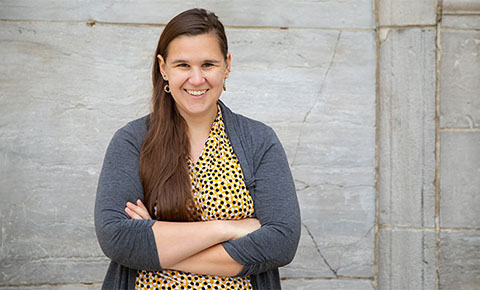As Told To: Amelia Plunk

Amelia Plunk (MSED17) is a curriculum designer and professional Dungeon Master who designs and runs private adventures as part of the fantasy role playing game Dungeons & Dragons (D & D).
I got into Dungeons & Dragons at MSED because of Tim Dohrer (assistant professor and director of SESP's teacher leadership program). He’s a big gamer, and one of the curriculum design classes he taught was like game theory in education. A group of us in that course decided to start a Dungeons & Dragons game together.
It was purely recreational. Then during the pandemic, we all found our own little online communities for socialization. I found Dungeons & Dragons.
D& D is my favorite game because it's so collaborative and so open ended.
I studied physics and material science and taught at The Ogden International School of Chicago before moving to curriculum design.
I loved teaching (in a classroom) but have had a hard time separating my emotions from my work. When you're in a classroom, and you deeply care about what you're doing and the students you're working with, it really takes a toll on your mental health.
I did that exercise – in a dream world, what would my job be? I thought, I’d love to professionally do Dungeon & Dragons. Is that a thing I can do? Somebody had posted a job listing that morning. It was one of those moments where I felt like the universe was talking to me.
I was the first person to submit a resume for it. And the organization was specifically looking for people in education because they wanted to start a dungeon master curriculum.
I run four-hour sessions in a couple of formats. We do corporate team building sessions and private games, where a group of friends sign up together. My favorite games are my public campaigns, where a group of strangers commit to playing every week together for a year-long adventure.
A game is a collaborative storytelling exercise, using our imagination, some visual cues, and then dice to make random decisions when we want to make sure things are fair.
The players each represent a different character. It’s my job to put in front of them environments and give them characters and scenarios to interact with.
I use so many of my teacher skills when DMing (dungeon mastering). I describe it like I'm orchestrating chaos, which is what the classroom is, right? I come into a class with a plan in mind. I need my students to understand Newton's second law. I come into a game with the plan in mind, I need my players to rescue this person. But I have to make room for what my students or players bring with them to the table.
It's scary to try and be creative in front of other people. But I say, just tell me your idea; we'll figure out how it works. Then I give them things to think about when they're not in the spotlight.
When I taught At Ogden International High School, I taught a three-hour Dungeons and Dragons seminar. It was the most popular seminar in the school; we always had a waitlist. It was also one of the most diverse groups in the school. A lot of kids were neuro atypical, and gender atypical.
It was just so cool to watch them explore themselves and explore social experiences. That was what fueled my interest in doing more DMing.
I don’t regret leaving the classroom, but I do regret leaving the way I did. I kind of cut and run because I was panicking, as opposed to making a more intentional decision and trying to understand why I felt so overwhelmed. I think it was ultimately the right decision. But it took me a few years to a few years of guilt, to understand that it was the right decision.
If I could change one thing about schools, high stakes testing would be gone. Literally the only purpose of high stakes testing is comparing students to one another.
The journey has been a little rocky, but the North Star that I learned about at Northwestern is still my North Star now. The ideals that Tim Dohrer and Michael Novak taught me are still the core things that help me form how I think about curriculum even though I’m not currently in the classroom.
I was working on a PhD in engineering before coming to SESP. That was wrong for me, very wrong. Now I’m getting increasingly curious about how to combine Dungeons & Dragons and social emotional learning into a PhD project in learning sciences.